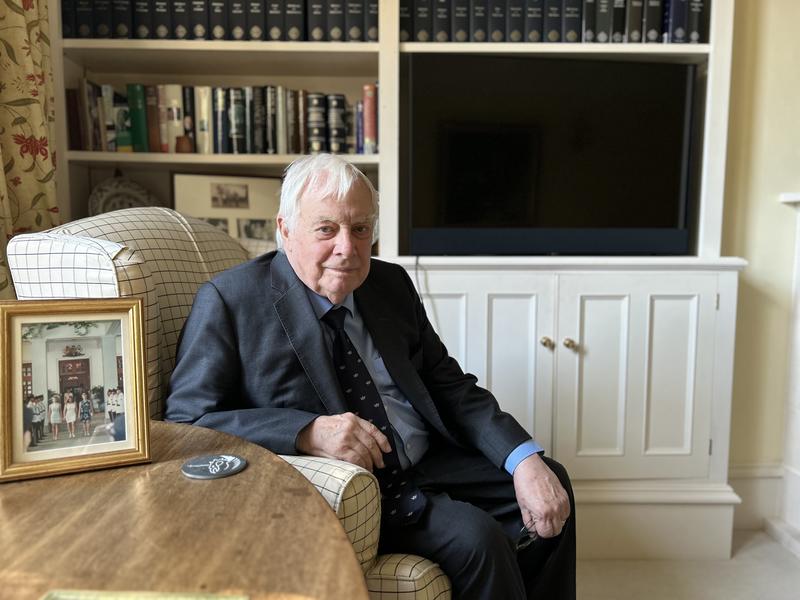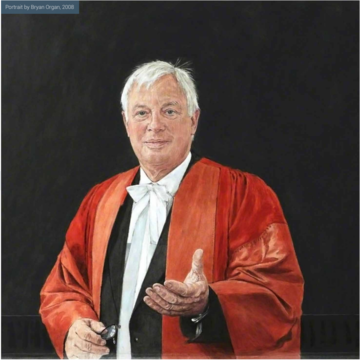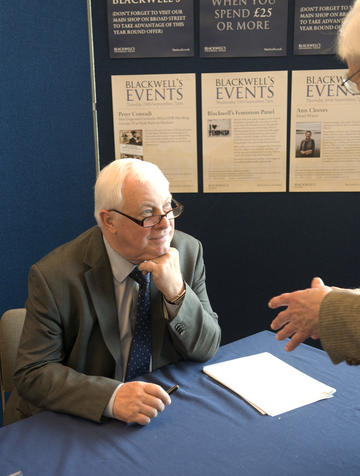FAREWELL CHANCELLOR

FAREWELL CHANCELLOR
In a farewell interview the Chancellor shares some memories and extols Oxford as a force for good in the world
Published: 23 July 2024
Author: Richard Lofthouse
Share this article
Chris Patten, Lord Patten of Barnes (Balliol, 1962), announced his retirement in February. He said then, ‘This year, I will have my 80th birthday in May. I hope that there will be many more birthdays to come. But I am unlikely to have another 21 years in the job as Chancellor of the University.’
Since then the stepping back has been gentle, but comprehensive, so much so that when we meet on July 10, he is shortly due at St Edmund Hall for dinner, one of six colleges to which he is officially a Visitor. Yet his official dinner was held two weeks previously at Keble College, by all accounts a wonderful event as well as a moving occasion.
It is a reminder that while officially the role of Chancellor is non-executive, and theoretically ‘ceremonial’, in practice Chris has performed tireless advocacy, with a batting average of over 60 international engagements a year, in addition to the ceremonial duties which sprawl well beyond the obvious one of Encaenia. He’s been a completely devoted servant of the University and a remarkable force for good.
He asks me if I know the revue comedy hit of the 60s 'Beyond the Fringe', which I do not, being just the youthful side of that era. It was the satire revue smash hit in the 1960s with more than a little Oxford content – Alan Bennett (Exeter, 1954), Dudley Moore (Magdalen, 1954), Peter Cooke, Jonathan Miller (both Cambridge).
He regales me with a brilliant Second World War vignette that the cast performed, called ‘Futile Gesture’, in which a Squadron Leader is telling a pilot about a plan for a raid that is so suicidal that he won’t return. Finally, the pilot says ‘Au Revoir’, to which the Squadron leader replies, ‘No, it’s not au revoir, it’s a case of Goodbye!’
Chris says that retiring from the Chancellorship has turned into a series of au revoirs, and rather lovely it has been.
Today we’re sitting in one of the light-filled drawing rooms in one of the lovely houses in North Oxford, and start with a couple of photos.
Chris has just been in discussion with a senior archivist concerning the donation of his archive to the Bodleian Library.
In the hour that follows he speaks eloquently about Oxford and about current affairs, this being five days after the General Election that delivered a Labour government and the 8th Prime Minister of his Chancellorship, seven of them Oxonian – including Sir Keir Starmer (St Edmund Hall, 1985, Law).
Chris has things to say about people and politics and public affairs and how Oxford University fits in, but first a visit down memory lane.
He says that his most common conversation he has had with Oxford alumni over his 21 years as Chancellor, has revolved around ‘the person here who really changed their life,’ – their tutor.
A scholarship boy from a West London suburb, where the Daily Express was read and where Roman Catholicism was the inheritance of an Irish father who played the drums for a band, the Chancellor looks back at Oxford with what for so many alumni will be a gasp of recognition.
‘I was made by the people who taught me history here.’ There were four in particular from a Golden Age of history at Balliol, Christopher Hill, Richard Cobb, John Prest and Maurice Keen.
Every student can recall their moment of comeuppance when their essay came unstuck, and Chris does this too via a funny memory about glibly pronouncing Charlemagne the founder of modern Europe, to which Maurice, who had a stutter, said, ‘I b-b-beg your pardon?’
But just as important is his recognition about how very different these tutors were from each other and from him. It’s a master class in identity, difference, and how to have an argument rather than a quarrel.
Hill was a Marxist Atheist, yet ‘one of the kindest, nicest people I’ve ever known’, while Maurice Keen was ‘one of the greats; immensely kind; that book Chivalry – he never really criticised – but he could be rueful; he was generous in ways people never knew, perhaps especially when they weren’t doing very well.’
Some of these observations are lovingly expanded in First Confession, Chris’ central memoir from 2017, and whilst it was penned just after the Brexit Referendum and the first election of President Trump, he agrees that a Second Edition might be on the cards – we hope so.
While the commentary about tutors casts back to 1962-5, an Oxford vastly removed from 2024, it permits Chris to say how ‘incredibly lucky’ he was, shaped by Balliol and by Oxford, that ‘after galivanting around the world,’ he might ‘come back [as Chancellor] in 2003.’
Since then, besides the eight Prime Ministers, he has seen the coming and going of 14 Secretaries of State for Education and five Vice-Chancellors.
I joke that he is younger than Joe Biden, and on a day when there is already fierce discussion about who now will now lead the Conservative Party, might he throw his hat into the ring and sort out his party? He appreciates the joke by laughing.
48 hours earlier he had told Sky News, ‘This is the oldest party in democratic history and it’s now been reduced to rubble by awful fractures and lousy policies and a collapse of any sense of values.’
‘It hasn’t been ruined by Rishi Sunak. It’s been ruined by people like Boris Johnson and Liz Truss and others.’

Later on I go further in asking, partly to temper the Balliol magic just a bit, whether the world would have been a better place without Oxford’s degree innovation (actually Balliol’s) of Politics, Philosophy and Economics, keeping in mind that it shaped the decision making of David Cameron (Brasenose, 1988), Liz Truss (Merton, 1993) and Rishi Sunak (Lincoln, 1998).
Clearly he is amused by this. ‘It’s not the subject but the bullshitters that in some cases we produce,’ he says without hesitation.
PPE was the Oxford degree subject of two Ministers in the new Labour government, Home Secretary Yvette Cooper (Balliol, 1987) and Chancellor of the Exchequer Rachel Reeves (New College, 1987).
However, he then adds that at a recent event in Balliol, he heard one alum saying to another right behind him, walking to dinner, ‘if there’s a picture of Boris in the hallway I’m leaving…’ To which he turns to me and says, ‘We can’t celebrate some of our Prime Ministers.’
As if balancing an invisible weight of partisanship, he then says, ‘I have huge sympathy for the position the new Labour government are in,’ disagreeing with the view that it in any way repeats 1997 when Tony Blair (St John’s, 1972) ushered in New Labour but did so with a fair-weather economy, totally unlike 2024.
Returning to his comments of two days earlier, he also told Sky News that the Conservatives now have to be reminded what it means to be in opposition, ‘That means opposing when it thinks things are fundamentally wrong but recognising as patriots that it is in our interest that Starmer should make a success of clearing things up.’
I’ve brought him two books by way of tribute, one a pre-press proof by a younger scholar, Kit Kowol, called Blue Jerusalem, which looks at the rather utopian cast of Tory mind in the 1940s (it’s published officially by Oxford University Press in September).
This immediately leads Chris to say that you need a consensus to achieve root and branch reform, and that in the 1940s and 50s ‘we had a consensus about welfare democracy – Butskellism.’
Regarding the funding of Higher Education in 2024, he says that it has become a total mess, calling out a ‘lack of guts’ among politicians to distinguish between different courses and universities, and the need for a wide plurality of apprenticeships and technical and vocational training, ideally with equal esteem.
‘It’s crazy to think that everyone can fund research on Ovid or Homer or Voltaire, or vaccines!’

But he extends his analysis to a recent political row about immigration, and the role of international students in swelling the figures, arguing that there is no proper labour market policy currently, hence the shortage of doctors and dentists.
‘So I think this is really fundamental, and it will be very difficult to sort out without root and branch reform in this country; very difficult without consensus.’
The other thing he notes about recent politics is the ‘conspiracy of silence’ that has failed to tell the electorate that ‘2 + 2 = 4’, in other words that they can’t have everything they want, and in the face of Faragism the trouble is that if the silence grows too loud or for too long, ‘it’s going to have a terribly corrosive effect on democracy.’
More locally, he says that the shape and size of Oxford’s student population is hardly the problem, with 80% of undergraduate places going to home students and the post graduate marketplace a cut-throat, global fight for the best talent – the worry not being who is British but whether we can get the best talent (currently 65% of Oxford’s graduate students are international).
On whether Joe Biden should step back from the forthcoming Presidential race in the US (by the time of publication, he had), Chris simply says, ‘It’d be a pretty good disaster if the election finishes up with a President who doesn’t really believe in democracy; who only thinks that democracy is about him winning, and who sympathises with autocracy everywhere, and who doesn’t know the difference between the rule of law and revenge – and I think to have the leader of the West protected by a politicised judiciary, is very bad for all of us who want to see the survival of democratic free societies.’
He then says that former US politician Adlai Stevenson II (1900-1965) ‘is one of my heroes’, recalling his advice that it’s easier to fight for your values than to live up to them.
It’s easy to forget what an Atlanticist Chris is – he really got his first break in politics via a Balliol scholarship called the Coolidge Atlantic Crossing Fellowship, which he compares to winning the lottery.
Standing back from it all, our Chancellor, formerly the last Governor of Hong Kong as well as European Union Commissioner, besides being an MP and Secretary of State, reminds me that while several of these ‘causes’ lie in tatters (he views Brexit as ‘choosing to dwell in an imagined past rather than make the most of a challenging future’ – never mind what China has done to Hong Kong) – yet his time at Oxford has coincided with a glittering era of expansion and pre-eminence that arguably outstrips even the earlier golden era of post-war expansion.
In other words, Oxford stands proud in his career, both at the start and the end of it.
Part of the reason for that is that the University has gone from being essentially a class-bound, private teaching university on the eve of the Second World War, to a large university 80% state funded by 1990; to a goldilocks economy where its income by 2016 of just over £1.3 billion was – says the Oxford historian Laurence Brockliss – fifty times higher in real terms than the equivalent figure in the 1930s, but by then only half of it coming from the state.
A lot of this ‘balancing’ has taken place under Chris’ watch as Chancellor, and while not every aspect of this transition has been smooth sailing, nonetheless it has re-staged Oxford as a global institution with global reach and ambition, with deep roots to commerce, the creation of intellectual property, and global impact such as the R21 malaria vaccine, as well as the ‘sold-at-cost’ Covid vaccine developed with pharmaceutical company Astra-Zeneca.

Time is running out and the driver has come to whisk Chris across to Teddy Hall. We briefly discuss Russian dictator Putin, whom Chris met perhaps a dozen times as European Union Commissioner, and who he has no hesitation in calling ‘evil.’ He also has time briefly to comment on his Roman Catholic faith, a deep part of his identity and character, and his laughter at recalling how he was slightly dropped in it by the then Prime Minister David Cameron, who told the Queen that Chris would sort out the visit to the UK (and Oxford) of Pope Benedict XVI in 2010 (he recalls that it was much harder dealing with Scottish First Minister Alex Salmond than it was dealing with the Vatican).
There is time for one more question so naturally I ask Chris whether there is one piece of advice that he would most want to share with Oxford alumni, or indeed anyone, drawn from his remarkable career in public life.
He doesn’t hesitate, launching into an anecdote about the brilliant post-war Chancellor of the Exchequer Rab Butler, and the tragedy of his not getting on well with former Prime Minister and Oxford Chancellor Harold Macmillan (Balliol, 1912).
Chris remembers strolling down Rab's garden, and Rab cutting delphiniums for Lavender. 'He had injured his arm and cut down at a very steep angle.’ Chris asked him the same question, about whether he had one summary piece of advice, to which he replied, ‘It’s more important [in politics] to be generous than efficient.’
Chris pauses before saying that these few words have shaped him to an extraordinary degree, to the point of wanting to write a whole book about what they mean.
‘He doesn’t literally mean it, … but if you had to choose, at the core of things, you’d lean in the direction of being generous. It’s had more impact on me than anything else anyone has ever said to me.’
To this he adds that Butler, the Cambridge man, was ambivalent and that ‘ambivalence is a great attribute in politics; so often there isn’t an easy answer to things, and so often knowing intelligently why you can’t make an easy choice, has a great deal to be said for it.’
Soon he will be decamping to France for that lovely decompression of high summer, and time with his wife Lavender, his three daughters and eight grandchildren.
It’s time to say farewell now but by way of doing so present him with a hardback (for its larger font) copy of Max Egremont’s The Glass Wall, which like First Confession is a masterclass study in human identity, inscribed ‘With Gratitude’. And then he leaves for his dinner, knowing, I’m sure, that Oxford is always here to welcome him back.
Interview held on July 11, 2024.
Pictures: Listing and lead portrait, Lord Patten on July 11, 2024 (University of Oxford/Richard Lofthouse); Planting a tree at the 400th Anniversary event for the Oxford Botanic Garden (University of Oxford); Signing Books at the Alumni Event Meeting Minds, 2013 (University of Oxford/John Cairns).















